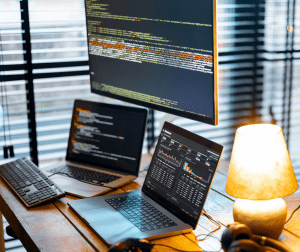 One often overlooked aspect of safeguarding sensitive data and networks is the separation of personal and work devices. Mixing personal web surfing and social media with company devices can expose businesses to significant risks, including data breaches and cyberattacks.
One often overlooked aspect of safeguarding sensitive data and networks is the separation of personal and work devices. Mixing personal web surfing and social media with company devices can expose businesses to significant risks, including data breaches and cyberattacks.
Why Should You Keep Personal and Work Devices Separate?
- Security Risks: Using company workstations or PCs for personal activities increases the likelihood of encountering malware, phishing attempts, and other cyber threats. Hackers target personal accounts like email and social media, and accessing compromised accounts from work devices can provide them with a pathway into the company’s network.
- Data Privacy Concerns: Personal browsing habits and social media interactions may inadvertently expose sensitive business information if conducted on company devices. This could lead to breaches of confidentiality and compromise the privacy of clients, employees, and proprietary data.
- Productivity Loss: Mixing personal activities with work responsibilities can lead to distractions and decreased productivity. Employees may spend excessive time on non-work-related tasks, impacting overall performance and efficiency.
- Legal and Compliance Issues: Many industries have strict regulations regarding data privacy and security. Failure to separate personal and work activities on company devices can result in non-compliance with regulations such as GDPR (General Data Protection Regulation) or HIPAA (Health Insurance Portability and Accountability Act), leading to potential legal consequences and financial penalties.
Best Practices for Maintaining Device Separation
- Establish Clear Policies: Develop and enforce policies that explicitly outline acceptable use of company devices and the consequences of violating these policies. Provide regular training and reminders to employees about the importance of device separation and cybersecurity best practices.
- Implement Technology Controls: Utilize endpoint security solutions, such as firewalls, antivirus software, and web filtering tools, to monitor and control employee activity on company devices. Implementing access controls and encryption can further protect sensitive data from unauthorized access.
- Encourage Personal Device Usage: Encourage employees to use their personal devices for non-work-related activities, such as checking personal email or social media, during designated break times. Provide resources and support for securing personal devices, such as recommending reputable antivirus software and educating employees on common cybersecurity threats.
- Regularly Update and Patch Systems: Keep company devices and software up to date with the latest security patches and updates. Regularly scan for vulnerabilities and address any issues promptly to reduce the risk of exploitation by cyber attackers.
Maintaining a clear separation between personal and work devices is essential for protecting your business from cybersecurity threats and ensuring the privacy and security of sensitive data. By implementing clear policies, utilizing technology controls, and promoting best practices, businesses can mitigate the risks associated with personal device usage in the workplace. Prioritizing cybersecurity not only safeguards your company’s reputation and financial well-being but also fosters a culture of security awareness among employees. Remember, when it comes to company devices, the only thing that should be on your mind is work.
For expert guidance on cybersecurity measures and technology solutions tailored to your business needs, don’t hesitate to reach out to us. Our team is dedicated to helping you navigate the complex landscape of cybersecurity and protect your business from evolving threats.
Explore a wealth of information on our website https://www.hammett-tech.com/our-blog/
Visit our Socials!
Author

